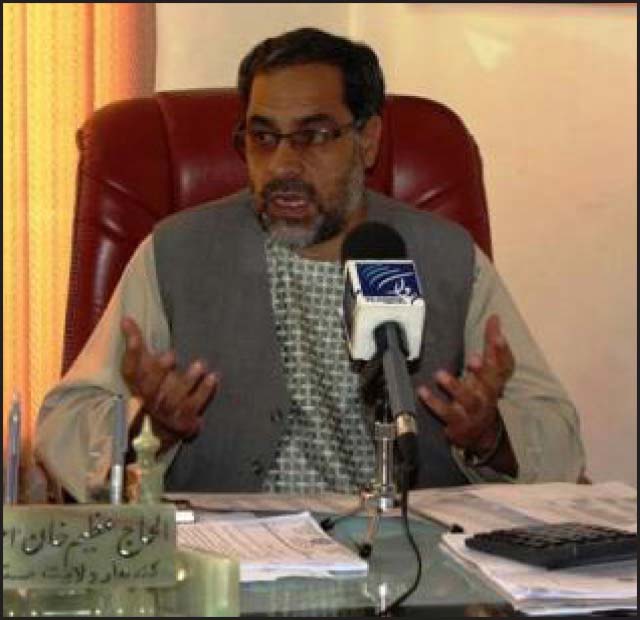KANDAHAR CITY - A large number of strongmen refuse to pay taxes, scuttling government efforts to collect or jack up its revenue, authorities say.
In an exclusive interview with Pajhwok Afghan News, Revenue Director Azim Khan Ahmadzai economic activity had decelerated in recently months.
The directorate receives taxes based on income-generating activities and sends the money thus collected to the central government via banks.
Following the withdrawal of foreign troops and provincial reconstruction team’s windup, he says, the number of logistical and construction firms in Kandahar has considerably fallen.
The few companies still in operation often complain to the directorate of an absence of projects. In recent years, most of revenue came from these firms.
However, the official acknowledges, their income has drastically slumped and they are trying to explore alternative income sources.
Ahmadzai says they are faced with different problems in realising income and property taxes from residents, notably gunmen and other influential individuals.
He adds they have shared with the central government and security organs the names of a large number of these strongmen refusing to pay taxes.
For instance, the official alleges, pump stations have been evading tax payments over the years. “In Kandahar, there are more than 100 pump stations that don’t pay taxes.”
But the revenue department are exercising various options to force these fuel stations into clearing their tax liabilities.
The director blames security institutions for failing to respond positively to a string of calls for cooperation with his department in tax collections.
Last week, he recalls, the issue was raised with the finance minister in Kabul. He also suggests tasking security personnel within the department to help realise government levies from chronic defaulters.
Higher-ups have assured him of sharing the proposal with the Ministry of Interior, according to the official, who says the list of defaulters will be forwarded to the security organs and media outlets.
But despite problems, he claims, Kandahar’s revenue for the current year is higher than 2014. He links the increase to an awareness campaign through media and institutional reforms.
The ministry had set the department a revenue target of 1.138 billion afghanis for 2014, but only 972 million afs were recovered, mainly due to the presidential election deadlock.
But in the first half of the current year, the department has collected 526 million afs in taxes -- a 42 million afs increase over the corresponding period of 2014.
He ties the revenue boost to the improving security and economic environment of the country, hoping continued stability will enable them to collect taxes from people in remote areas.
Currently, the Kandahar Revenue Department has branches in Spin Boldak, Panjwai, Maiwand, Dand and Daman districts. Better security will help it collect taxes in other districts as well.
Ahmadzai reveals they have rented out 59 government properties, yielding 17 million afs in revenue so far during the current year. In this area as well, gunmen pose a problem for the authorities.
“The strongmen have occupied a number state-owned properties. Whenever, these properties go under the hammer, bidders evince little interest in them because of the gunmen,” he argues.
The issue has been shared with the governor’s office, with the director hoping the eviction of the illegal occupants will spur provincial revenue.
As of August 2015, he reckons, the department’s consolidated revenue stands at three billion afs. However, salaries of military and civil officers work out at more than 13 billion afs.
While ruling out any delay in salary payments, the director insists most of such disbursements are made on the dot through banks.
As part of efforts to check corruption, he says, people have been informed that revenue officials are not authorised to receive cash taxes, which have to be deposited in banks. (Pajhwok)

